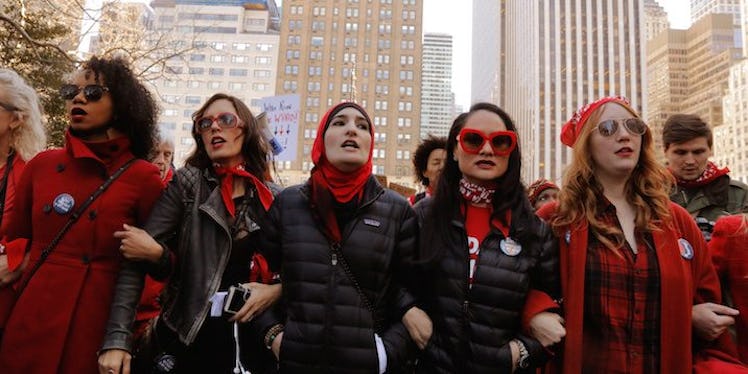
Women’s March Leader Explains Why The Event Was Upsetting For Her
The leaders of the Women's March talked about why organizing has been so bittersweet.
National Women's March Co-Chair Tamika Mallory revealed seeing the masses of women in DC for the inaugural Women's March was inspiring, but it also made her sad to think about what led to this activism -- and how it could end.
Co-Chair Linda Sarsour echoed her sentiments, calling for better activism from all women. These comments were made at the Women in the World Summit in New York City on Friday afternoon.
The Women's March protests on January 21 this year showed women demonstrating in unprecedented numbers. Mallory said it was "amazing" to see so many women standing up against general misogyny in the White House.
But, she said,
I did stand on that stage looking at so many people pouring into DC and feel a little sad because for some of the folks who showed up, their activism or their moment of awakeness started with Donald Trump, and so it ends there. Where people who have been oppressed in America feel like Donald Trump is just an extension of what has been happening.
Sarsour echoed this. She noted her activism originated after 9/11, when the Muslim community was extremely marginalized by discrimination, especially in New York City, where she grew up.
So while she's "gratified" to see so many women now awakened to activism, she hopes people recognize livelihoods have been threatened for different communities long before the election of Donald Trump.
"I welcome you to the movement right now, but don't leave us," Sarsour said. "Don't leave us when that anxiety goes away, don't leave us when you're not feeling afraid anymore. Understand that there are some of us who are in perpetual fear, perpetual outrage, and I hope that you stay in the movement with us."
Sarsour added that activists' work is far from done in this administration. She said,
When we think about Donald Trump, people may think they saw the worst of it, but we actually feel like the worst of it is yet to come. So we come from these communities where we've seen a lot, we've experienced a lot, so we don't even know what this administration is capable of.
They said it's especially important for white women to consider rights beyond their own.
For example, we celebrated Equal Pay Day this week, marking the point of the year when women earn as much as men did the previous year. But that date for black women won't even come until August because the pay gap for them is even wider.
"What I am afraid of … [is] the idea that once you get equal pay -- which means a white woman making as much as a white man -- you will not be concerned about the fact that women of color are not even on the level of white women," Mallory said.
Mallory and Sarsour highlighted the need for white women to listen to marginalized people as they come to activism.
"It's not enough to study it and think you know it," Mallory said. "You have to actually allow the people who experience it to be heard."